 On an early September morning when the first rays of the sun peek over the eastern hills, and the fog is still settled over the rooftops of our small village, this is when my grandfather would rise for his big day — the grape harvest. The morning air is filled with a crispness that indicates the end of the summer months. He let the grapes soak in the sunlight for as long as he could. Now is the time to cut the grapes from the vine.
On an early September morning when the first rays of the sun peek over the eastern hills, and the fog is still settled over the rooftops of our small village, this is when my grandfather would rise for his big day — the grape harvest. The morning air is filled with a crispness that indicates the end of the summer months. He let the grapes soak in the sunlight for as long as he could. Now is the time to cut the grapes from the vine.
 I can still see him sitting in the large kitchen at the wooden table, breaking bread into his morning coffee. A fire crackling in the stove nearby, he quietly prepares himself for the day ahead. Dressed in his corduroy pants, flannel shirt and sweater, with his dog sitting faithfully by his side, he must have often thought back to the times when he first started following his heart — cultivating a vineyard.
I can still see him sitting in the large kitchen at the wooden table, breaking bread into his morning coffee. A fire crackling in the stove nearby, he quietly prepares himself for the day ahead. Dressed in his corduroy pants, flannel shirt and sweater, with his dog sitting faithfully by his side, he must have often thought back to the times when he first started following his heart — cultivating a vineyard.
Growing grapes on Franconian soil (Franconia is a sub-state of Bavaria, Germany) has been a tradition for over 500 years. Even in the very small village where my grandparents lived, farmers kept vineyards on low-lying slopes for many centuries. The soil is rich in lime and other nutrients that are favorable for the type of grapes he grew such as Mueller-Thurgau and Silvaner. A preference for beer eventually shut down the interest in making wine until in 1936 when my grandfather re-discovered its ancient art form.
My mother always said it was his hobby, since his occupation as a baker and farmer was of a different nature. I call it his passion, for he searched for a long time for the right plot of land where he could plant his vineyard. He completed soil tests, checked temperatures and measured the amount of sunlight over different periods of time until he finally decided on purchasing a large-sized area on the southern slope of a hill. The land is located just north of the village with a breathtaking view over the valley, forests, and fields.
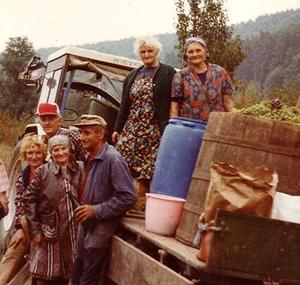 By this time his hired helpers have arrived. Most of them were men and women from the village. My uncles and dad would be amongst the volunteers, who also included some of the patrons that visited his tavern to drink his wine and listen to my grandfather’s stories. They wanted to be part of the harvest because of its festive nature. Of course, the kids came along, too, including myself.
By this time his hired helpers have arrived. Most of them were men and women from the village. My uncles and dad would be amongst the volunteers, who also included some of the patrons that visited his tavern to drink his wine and listen to my grandfather’s stories. They wanted to be part of the harvest because of its festive nature. Of course, the kids came along, too, including myself.
The men started loading large wooden barrels on my grandfather’s trailer which was pulled by a tractor. Once people found a place to sit or stand on the trailer, the grape-pickers were on their way heading out into the morning sun. I always thought this to be a proud moment for my grandfather. He is heading out to harvest his fruit. With his customary beret on his head, he would greet each passing villager with a bow and a wave as he sat on his tractor with his dog, Schlumper, by his side.
The German word for a vineyard owner is Winzer and I could not find a proper translation for this word. There is a saying in Germany that a Winzer must nurture his vineyard like a young child. It requires constant care, time, and patience. I am not surprised then that the Bible uses a vineyard for many metaphors.
When my grandfather started working on his vineyard, he had two helpers. They plowed the soil, removing limestone rocks and roots. He separated the slope into three terraces, walling off each end with the rocks they pulled out of the ground. The upper and lower terraces were the shortest in length, with the middle being the largest terrace to work with. When the war broke out in 1936 he stopped his project.
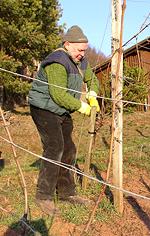 Once the war ended in 1945, my grandfather continued with his passion and followed through in completing his vineyard. He set up wooden posts, stringing wire through each of them, and then finally planted the young grapevines. From that moment on, he was forever attached to this plot of land. Every moment he could spare he would spend in his vineyard. Even on Sundays you could see my grandfather walking north. In his Sunday suit and hat, his walking stick in his hand, he made his daily pilgrimage to his vineyard.
Once the war ended in 1945, my grandfather continued with his passion and followed through in completing his vineyard. He set up wooden posts, stringing wire through each of them, and then finally planted the young grapevines. From that moment on, he was forever attached to this plot of land. Every moment he could spare he would spend in his vineyard. Even on Sundays you could see my grandfather walking north. In his Sunday suit and hat, his walking stick in his hand, he made his daily pilgrimage to his vineyard.
It truly was a labor of love. As the plants matured, there was a lot of pruning to be done, and just at the right spot. Each vine will bring forth the desired grapes if offshoots are cut properly. The vines had to be strung along the wires. In order for the soil not to wash off during rainy season, the weeds were left in for a while before the family had to be brought in to pull weeds with a special two-clawed hoe. My dad had to spray the vineyard for bugs and other diseases for many years. Even today my father will tell stories of how his back suffered during spraying season.
I remember one late afternoon during the summer when my grandfather and I went into the vineyard to place these spider-web nets over the plants so the birds wouldn’t pick the ripened grapes. Since a Winzer wants the grapes to sweeten for its sugar content, he needs to take advantage of the sunlight for as long as possible. Scarecrows were set up and occasional shots were fired during that time to scare the birds away. The net was a new gadget he came across. We started in the middle terrace and stretched the net over several rows at a time. Not even a bee sting could stop me from finishing this job with my grandfather.
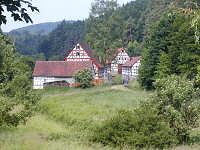 It was during one of my vacations with him that I remember standing in front of the old wooden tool shed he had built, looking down into the valley. The picture is imprinted in my memory forever, and has a soothing effect on me each time I recall this scenery.
It was during one of my vacations with him that I remember standing in front of the old wooden tool shed he had built, looking down into the valley. The picture is imprinted in my memory forever, and has a soothing effect on me each time I recall this scenery.
On my left side was a vast forest with the splashing sound of a spring singing from the woods. The sound of a Kuckuck bird echoed through the forest. Right below me was a meadow that was covered with wild flowers. The humming of bees and insects buzzed from the grass. Past the meadow, right over the treetops, I was able to see the church tower and several houses. On my right, below me, was the old cemetery right outside town.
An old stone wall surrounds this ancient cemetery in which the memories of the deceased are forever etched in marble covered tombstones. Each grave is a garden of the living, carefully decorated with flowers, shrubs and evergreens and tended by a family member. Every evening before the sun set, I could see the widows watering the graveside of their loved one. Loyal to their duty each day, they found comfort in that daily chore.
 The old water pump was near the big stone cross that sat at the top of the graveyard, right in the center. I used to like going there in the evenings to water the graves, sometimes with a friend or with my grandmother to tend to one of those memorial plots. The cross was like a protective shield with welcoming arms making the place of death a place of peace. No wonder the German word for cemetery is Friedhof meaning the yard of peace. When I stood at my great-grandparents grave, I could see the vineyard from there. It was forever in view.
The old water pump was near the big stone cross that sat at the top of the graveyard, right in the center. I used to like going there in the evenings to water the graves, sometimes with a friend or with my grandmother to tend to one of those memorial plots. The cross was like a protective shield with welcoming arms making the place of death a place of peace. No wonder the German word for cemetery is Friedhof meaning the yard of peace. When I stood at my great-grandparents grave, I could see the vineyard from there. It was forever in view.
Picking grapes requires a lot of sitting on the ground and bending. When I was present during the harvest, my brother and I would run through the rows checking out the grapes by tasting here and there. Most of the time we were rolling down the hill and watching the dog dig into a mouse hole because he picked up its scent. He would just go totally nuts in the way he stuck his snout into the hole with such insanity that I was convinced he would faint any minute. Even the dog loved being up there. I think he became drunk from all the excitement, which was quite evident by the soil left on his nose.
 The women would be talking to each other through the rows, laughing at times, while collecting the fruit in their baskets. My father carried the so-called Butte (a word used in our local dialect which describes the tub strapped to a man’s back) into which the helpers would empty their filled baskets. Once my father had a full tank of grapes, he emptied them into large wooden barrels on my grandfather’s trailer.
The women would be talking to each other through the rows, laughing at times, while collecting the fruit in their baskets. My father carried the so-called Butte (a word used in our local dialect which describes the tub strapped to a man’s back) into which the helpers would empty their filled baskets. Once my father had a full tank of grapes, he emptied them into large wooden barrels on my grandfather’s trailer.
The trip down into the village was almost ceremonial. My dad said it was like a parade. When the fresh grapes were carried back, someone on the wagon would throw them to the villagers as they passed them on the street. People would comment and laugh. I can only imagine this scene as a sharing of joy.
This process went on all day. Once the barrels were filled, the load was brought back to the house and emptied into a hand-cranked press for the first grape pressing. Next, the smashed grapes were poured into a much bigger, round grape press called Kelter that is made out of wood and steel. The larger press required someone to turn the handle while the juice was captured in large containers below. These containers were emptied into the big wine barrels located inside the wine cellar which can hold as much as 500 liters per barrel. Drinking too much of the grape juice can have serious consequences. I learned my lessons in childhood.
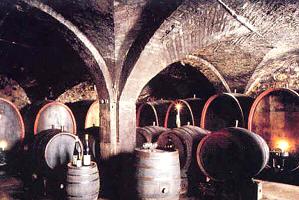 This ritual was repeated until all the grapes had been processed. The workers would break for lunch, and after an hour of eating their bread, sausage and beer went right back to work. Then the vineyard received a well-deserved rest. It could finally shed its leaves before my grandfather went back during the winter months to cut back the vines.
This ritual was repeated until all the grapes had been processed. The workers would break for lunch, and after an hour of eating their bread, sausage and beer went right back to work. Then the vineyard received a well-deserved rest. It could finally shed its leaves before my grandfather went back during the winter months to cut back the vines.
By sundown the task was completed. The workers went home one at a time, after they finished a glass of wine and conversed about the day. My grandfather could still be found in the back of his wine cellar, tinkering with his wine, until finally my grandmother would call him in to rest. He’d recline in his simple chair in his guest room catching the news, throwing a log of wood on the fire in the stove next to him. Traditionally, he sipped on a small glass of wine before bedtime. After a day like this a glass of wine of the previous vintage is all he needed to call it a day. His thoughts by now must surely have been on the quality of the new wine.
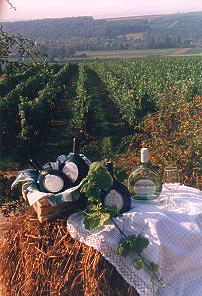 Franken wines are quite different than Rhine wines. Because of the cooler climate and the soil, the wines have fuller-bodies, are less aromatic, and are dry and earthy tasting. They are considered to be the most masculine wines of Germany, also sometimes referred to as Steinwein. The finest Franken wines are bottled in a Bocksbeutel, a squat green or brown flagon with a round body. A Bocksbeutel gives an instant recognition of a Franken wine, and can only be bottled that way in the Franconian region of Germany.
Franken wines are quite different than Rhine wines. Because of the cooler climate and the soil, the wines have fuller-bodies, are less aromatic, and are dry and earthy tasting. They are considered to be the most masculine wines of Germany, also sometimes referred to as Steinwein. The finest Franken wines are bottled in a Bocksbeutel, a squat green or brown flagon with a round body. A Bocksbeutel gives an instant recognition of a Franken wine, and can only be bottled that way in the Franconian region of Germany.
A few weeks after the harvest when the fermentation process is not quite over, and the wine still has its sweet and bubbly taste, this is the time known as Federweisser time. The young wine sold at the tavern and, according to tradition, served with onion cake. Rather than drink it out of glass, its taste was enhanced by cool clay cups. People love the taste of this stage of the wine because of its potency and sweetness.
My grandfather stayed busy with his vineyard and winemaking until the day he passed away in 1980. He is now buried in the cemetery with the old stone wall and cross, having a view of the beloved vineyard that became his kingdom. My uncle, his eldest son, continues the passion of the vine. The wine label is called Kruemmler Himmelreich (Krum being the name of the village) and references the name given to the hill on which the vineyard was planted. It literally means "Kruemmler’s Heavenly Kingdom." What an appropriate name for such a wine considering its location.
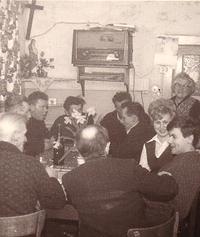 Whatever originally motivated my grandfather to start such an undertaking, it turned out that the vineyard became his life. The vineyard was in itself a living thing that, if given the proper care and attention, would yield the sweetness of its fruit. It became my grandfather’s place of peace as well as worries. Yet, he could not stay away from it. His focus was its nurturing and its need. He matured right along with the first seedlings that were planted.
Whatever originally motivated my grandfather to start such an undertaking, it turned out that the vineyard became his life. The vineyard was in itself a living thing that, if given the proper care and attention, would yield the sweetness of its fruit. It became my grandfather’s place of peace as well as worries. Yet, he could not stay away from it. His focus was its nurturing and its need. He matured right along with the first seedlings that were planted.
I always thought that it was interesting that his desire to plant a vineyard happened right before the war started. During the war years, his desire must have never wavered. He maintained the hope that he would complete his project just as he envisioned it. Hope is such a life-giving energy that brings purpose to one’s life.
There are times when the world makes no sense. It’s in those times when the darker forces seem to rule. I think faith brought my grandfather through it, just like it has many other people who experienced worse things. Many innocent lives were lost, but this truth can be passed on to a new generation. It cannot be seen or touched, but there is a certainty that one can overcome the worldly trials. It can grow over time so strongly that it will outgrow any other virtue. Faith can carry a person’s life through the chaos.
The message that I received over the years from my grandfather’s vineyard is that my vineyard — my life — must be tended by a good Servant. It is tended by a loving Servant whose pruning, nurturing and care can make life into a prosperous garden that can be shared with many. The hailstorms and early frosts cannot be controlled, but the Servant keeps coming back to tend to its need. The love of the Servant heals its bruises.
 A vineyard needs a joyful Servant, so the terror of the world won’t rob it of the joy that life brings. It needs a faithful Servant, so the paranoia of the weak won’t lessen faith that love will triumph over evil. Because the only things eternal are hope, faith and love, and the greatest of these is love. What else can we pass on to our next generation but a well-tended vineyard that speaks of these things? If evil can take away hope, faith and love then life in itself would have no meaning. It would be like a wild vineyard without direction left to its own ruin. A vineyard needs the tending of a faithful Servant to keep these fruit-bearing characteristics alive in our world.
A vineyard needs a joyful Servant, so the terror of the world won’t rob it of the joy that life brings. It needs a faithful Servant, so the paranoia of the weak won’t lessen faith that love will triumph over evil. Because the only things eternal are hope, faith and love, and the greatest of these is love. What else can we pass on to our next generation but a well-tended vineyard that speaks of these things? If evil can take away hope, faith and love then life in itself would have no meaning. It would be like a wild vineyard without direction left to its own ruin. A vineyard needs the tending of a faithful Servant to keep these fruit-bearing characteristics alive in our world.
 My grandfather had it right. At the end of the day, he sat in his chair and was content to sip on his wine, and call it a day. He abided in the vine that gave him a life with a purpose.
My grandfather had it right. At the end of the day, he sat in his chair and was content to sip on his wine, and call it a day. He abided in the vine that gave him a life with a purpose.






